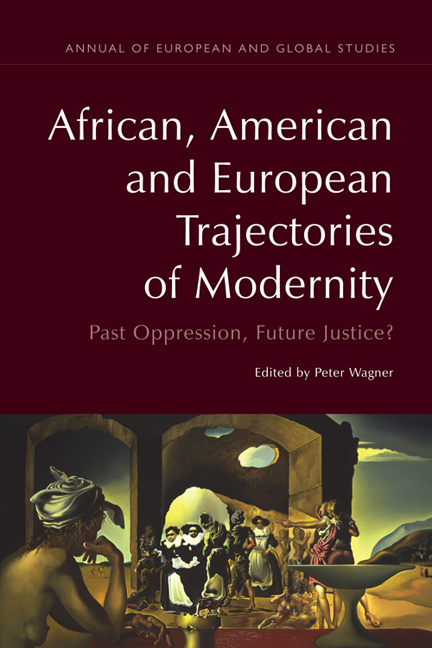Book contents
- Frontmatter
- Contents
- List of Figures
- Introduction
- Part I Reconstructing the History of Atlantic Modernity
- Part II Comparing Trajectories of Modernity in the South
- Part III Claims for Justice in the History of Modernity and in its Present
- 9 An Unsettled Past as a Political Resource
- 10 Injustice at Both Ends: Pre- and Post-apartheid Literary Approaches to Injustice, Sentiment and Humanism in the Work of C. Louis Leipoldt, Pumla Gobodo-Madikizela and the Film Invictus
- 11 The Student Movement in Chile 2011–12: Rearming the Critique of Capitalism
- 12 Indignation and Claims for Economic Sovereignty in Europe and the Americas: Renewing the Project of Control over Production
- Notes on the Contributors
- Index
10 - Injustice at Both Ends: Pre- and Post-apartheid Literary Approaches to Injustice, Sentiment and Humanism in the Work of C. Louis Leipoldt, Pumla Gobodo-Madikizela and the Film Invictus
from Part III - Claims for Justice in the History of Modernity and in its Present
Published online by Cambridge University Press: 05 August 2016
- Frontmatter
- Contents
- List of Figures
- Introduction
- Part I Reconstructing the History of Atlantic Modernity
- Part II Comparing Trajectories of Modernity in the South
- Part III Claims for Justice in the History of Modernity and in its Present
- 9 An Unsettled Past as a Political Resource
- 10 Injustice at Both Ends: Pre- and Post-apartheid Literary Approaches to Injustice, Sentiment and Humanism in the Work of C. Louis Leipoldt, Pumla Gobodo-Madikizela and the Film Invictus
- 11 The Student Movement in Chile 2011–12: Rearming the Critique of Capitalism
- 12 Indignation and Claims for Economic Sovereignty in Europe and the Americas: Renewing the Project of Control over Production
- Notes on the Contributors
- Index
Summary
THE TERM ‘INJUSTICE’ is ubiquitous with South Africa's pre-1994 past, casting its overt influence over almost every aspect of modernity and lived experience of most black South Africans during the twentieth century. No history of the country could, in any way, avoid clear reference to the spectre of apartheid that conjoins the legacy of a segregated past with the contemporary, twenty-first-century efforts at forging a national identity based on the adjective ‘New’. The tension as well as constant interplay and peopled dialogue between the ‘Old’ South Africa before 1994 and the ‘New’ South Africa post-1994 permeate current thinking around remedial and reconstructive approaches to settling the country as a key player in the global South.
Evidence of ever-snowballing, robust debates around similarities and differences between the past and present of South Africa can be sourced in almost all facets of deliberative and urgent conversations that form part of daily rhetorical routine. In essence, there are few conceivable ways of separating these present-day concerns from the larger history of South Africa, in which racial inequality and its ensuing calamities reach back to the 1600s. The term ‘injustice’ is connected to all these.
For the purposes of this chapter, I concentrate on literary and cultural articulations of senses of injustice in spheres of South African experience. I hope to avoid some of the more obvious questions concerning the state of the nation and how it was shaped, looking instead at two divergent instances of what led to that very shaping. Ambitiously, the gambit is to posit as two poles, on the one hand, the circumstances of Union-era South Africa in the 1910s and, on the other, the ways of anti-aggression prevalent in, but not always ascribed to, forms of South African literary thinking in the first decade of the twenty-first century. The point is not to compare two disparate South Africas almost a century apart, nor to search for similarities, but, rather, to look at the different dealings with injustice as it occurred in South Africa's sociopolitical history. At the one end, the 1910s, the argument I pursue is crudely an exposition of a sense of injustice held on to by actors, in the process of forcing outright injustice on to others.
- Type
- Chapter
- Information
- African, American and European Trajectories of ModernityPast Oppression, Future Justice?, pp. 219 - 237Publisher: Edinburgh University PressPrint publication year: 2015



